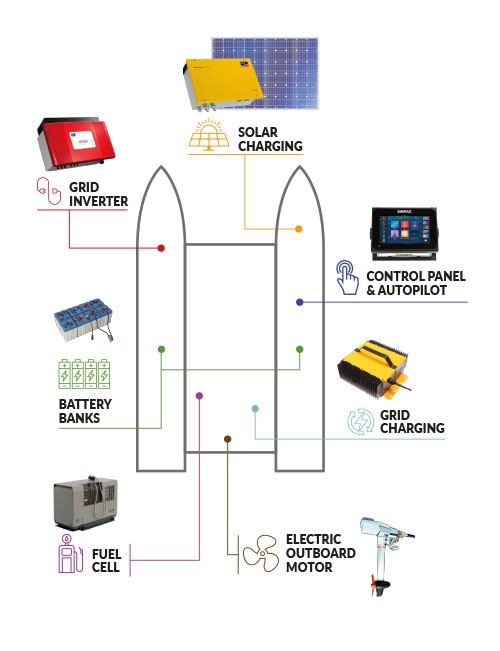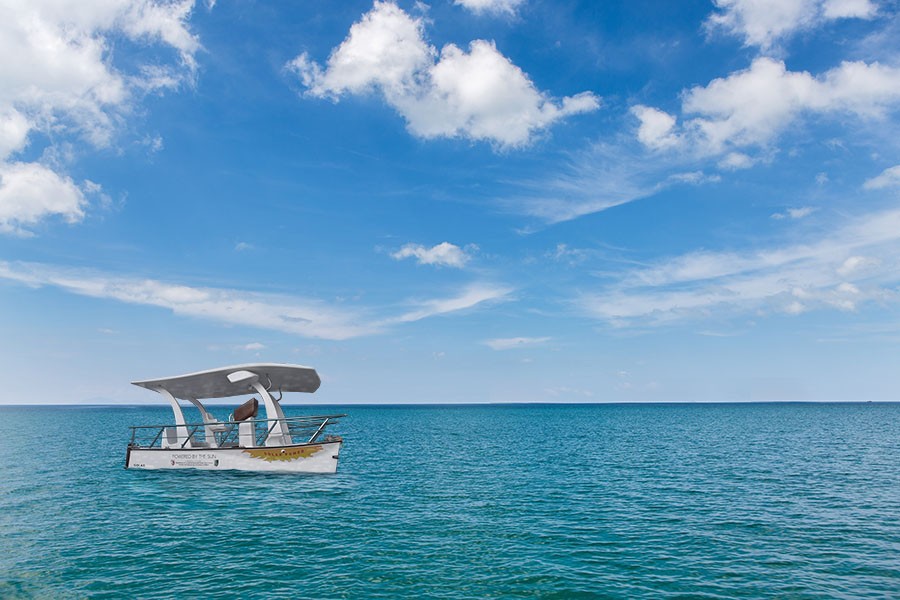Despite their many drawbacks, fossil fuels maintain a toxic hold as the world’s primary energy source. To release ourselves, we need innovative approaches to sourcing and managing energy. At the University of Malta, researchers have designed a solar-powered catamaran that uses smart-charging and battery management to efficiently utilise renewable energy. The project aims to serve as inspiration to usher in a future of environmentally friendly vehicles. Words by Diane Cassar.
Our globalised economies demand distribution. Commodities and cargo can be flown and driven, but it is shipping that carries 90% of international trade. This worldwide transport network runs on fossil fuels—frightening volumes of it. Effectively, fossil fuels make contemporary economic growth and development possible. But with fuel prices fluctuating viciously and environmental impacts sending shivers down spines, the issues cannot be ignored forever.
 The transport sector accounts for nearly one-quarter of global energy-related carbon dioxide emissions. In turn, maritime transport is responsible for about 2.5% of global emissions and is expected to increase by 50% to 250% by 2050, a worrying thought when considering its dependence on oil and internal combustion engines. The problems associated with these are common knowledge but no less devastating to the marine environment. Unpleasant noises and smells have a negative impact on both wildlife and the experience of those on the boats, particularly in the tourism sector, and the high fuel consumption and operational cost can make journeys financially unfeasible.
The transport sector accounts for nearly one-quarter of global energy-related carbon dioxide emissions. In turn, maritime transport is responsible for about 2.5% of global emissions and is expected to increase by 50% to 250% by 2050, a worrying thought when considering its dependence on oil and internal combustion engines. The problems associated with these are common knowledge but no less devastating to the marine environment. Unpleasant noises and smells have a negative impact on both wildlife and the experience of those on the boats, particularly in the tourism sector, and the high fuel consumption and operational cost can make journeys financially unfeasible.
To mitigate these major worldwide concerns, researchers are developing alternative energy sources, such as solar, wind, and hydro energy. However, while the concept of using renewable energy and electric methods of propulsion on land has been progressing quite rapidly over the past decade, the adoption of these technologies for marine applications is proving much slower for various reasons. One particularly salient aspect of this task is energy storage: a valuable asset for vehicles travelling over long distances and far from established sources of fuel.
A team of engineers (from the Department for Industrial Electric Power Conversion, Faculty of Engineering, University of Malta) has been studying the exploitation of renewable energy and energy storage for small vessels on short trips. The result is a cutting-edge electric catamaran powered by battery energy storage in conjunction with photovoltaic (PV) panels and fuel cell technology.
Malta is bestowed with the EU’s highest intensity of solar radiation—perfect for photovoltaic panels.
This custom-made catamaran needs to be environmentally friendly and provide performance comparable to an equivalent fuel-powered vessel. The five metre prototype is capable of carrying seven passengers and has successfully tested through a number of sea trials. The final trials are planned for the coming months.
Malta is bestowed with the EU’s highest intensity of solar radiation—perfect for PV panels. The high amount of electricity that PV panels in Malta can generate makes solar ideal for the islands to achieve carbon-neutral transport. PV systems comprised of flexible panels have been integrated in the solar catamaran’s roof and are used to charge the on-board battery. Secondary power is provided by a fuel cell which runs on methanol. The electric motor that operates the catamaran has a number of environmental advantages when compared to an internal combustion engine. It is proven to leave a much smaller carbon footprint than a fossil fuel engine. It does not pollute the water either, since it doesn’t emit any exhaust gases nor release any oil or unburned fuel into the water that harms the sea. Moreover, electric motors do not produce any unpleasant smells during operation and are much quieter than comparable combustion engines. A solar-powered catamaran is ideal for port areas, leading to cleaner air and less noise pollution
Electric sea transport has several environmental benefits and lower running costs. Yet, its uptake is hindered by the scarcity of commercially available solutions. Existing options lack adaptability to meet the requirements of catamaran owners ,and they incur high investment and maintenance costs in order to ensure reliable performance and a reasonable battery lifetime. The solar catamaran wants to solve these problems and develop a cost-effective solution for the conversion of fuel to electric-powered vessels that can be replicated on a local level. An online battery management system is used to optimise the performance of the energy generation, storage, and propulsion system of the catamaran, ensuring reliability. This remote monitoring and control over the vessel’s batteries helps to keep their charge within a safe and useful window of operation and increase the batteries’ lifetime, thus reducing maintenance costs. The system also allows for the application of smart charging, through which the user can charge different onboard technologies before the vessel embarks on planned trips, and can also sell electricity to the grid while the vessel is berthed and not in use. This feature makes the boat more cost-effective.
Turning the solar catamaran into a viable product for the market can have a huge impact on Malta and beyond. It will help develop green transport, reduce the carbon footprint, and perhaps create a new market for Malta to offer worldwide.
The solar catamaran prototype can serve as a showcase and inspiration for electric-powered transport in our harbours, proving that it’s possible to design and execute a cost-effective system which is both environmentally friendly and reliable. The project can be replicated through the conversion from fuel engines to electric motors for small vessels operating in the Grand Harbour area, as well as for short trips to Blue Grotto and the island of Comino, and for round trips around Malta. This can be very beneficial for the tourism industry, making these trips more attractive by eliminating exhaust gases and significantly reducing noise. The serene atmosphere we would all love to have on our sea is not a reality yet. But it could be…





Comments are closed for this article!